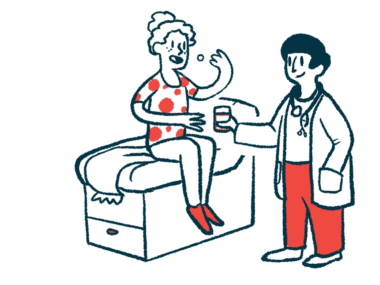‘Let’s Talk About Sex, Baby’
Written by |

“Let’s talk about sex, baby/ Let’s talk about you and me/ Let’s talk about all the good things/ And the bad things that may be.”
Am I aging myself by referencing a Salt-N-Pepa song? Maybe. But I think the topic of sex is important to discuss. Yet it often flies under the radar.
Sex and intimacy often mean the same thing for people in a relationship. But when you have a rare disease like myasthenia gravis, finding ways to separate the two is important. My husband and I are frequently asked how we make sex work in our relationship. It’s also a topic commonly mentioned by younger people in support groups I follow.
Sex and intimacy
How can sex happen without exacerbating symptoms? The key to unlocking this Pandora’s box is communication. For example, how do you and your partner define intimacy? Have you discussed it? Does intimacy refer simply to sexual acts? If so, I believe problems may arise as a result. Intimacy refers to close and affectionate relations with others, not simply specific acts.
The same question applies to sex. Do you and your partner define it as the act of intercourse? Does it include other physical acts, such as oral sex, manual manipulation, or other forms of stimulation?
Sex and intimacy are often linked together, but they don’t have to be. Moreover, when you have a chronic illness, I don’t believe they should be.
As women (yes, I’m stating a generalization here), we often tend to lump sex and intimacy together. I know I did. It took having some uncomfortable discussions with my husband to learn to separate the two. Being intimate and maintaining that intimacy in our relationship has been an important part of what has made our marriage work for the past eight years.
Physical pursuits
How do we make it work? Firstly, we time our sexual encounters together around when I take meds, so that I’m at my strongest. Secondly, we experiment with various physical strategies.
I had to learn to grow comfortable with verbalizing what worked for me in terms of positions, as well as things that didn’t. For example, one position causes my legs to fatigue easily and increases my generalized weakness for hours afterward, so we avoid it. While lying on my stomach is enjoyable, it can suppress my breathing if pillows and blankets are in the way. And while “spooning” provides the most support and allows for a longer period of engaging in physical pursuits, it isn’t as enjoyable.
What doesn’t work
What doesn’t work is feeling embarrassed about having these conversations with your partner. Belittling each other or making your partner feel guilty about being unable to do certain things also doesn’t work. And you should always speak up if something you and your partner are doing causes a flare-up or exacerbates your myasthenia gravis symptoms.
Don’t try to hide it
I’m 38, and my husband is 39. He has only known me sick with what we now know is myasthenia gravis. When we met, I had just left the Army, and all he knew was that I had a lot of health issues. We’ve been together for a decade now, and married for eight years, yet we are still figuring things out.
We have open discussions about our physical and emotional needs. Some things are uncomfortable for me, and others are uncomfortable for him. Together, we work on finding solutions that make us both happy.
Being open with your partner about what you are physically and emotionally capable of providing is important for a long-term relationship. I see too many young people who try to hide their disease from potential partners only to discover later that the tactic doesn’t work.
The bottom line is that when it comes to sex and chronic illness, whether it’s a shout from the rooftops or a whispered roar, communication is everything.
Note: Myasthenia Gravis News is strictly a news and information website about the disease. It does not provide medical advice, diagnosis or treatment. This content is not intended to be a substitute for professional medical advice, diagnosis, or treatment. Always seek the advice of your physician or other qualified health provider with any questions you may have regarding a medical condition. Never disregard professional medical advice or delay in seeking it because of something you have read on this website.




Linda L Christensen
I was diagnosed with MG in 1959. There were days I lay face-down with a washcloth under my mouth because i could not swallow my own saliva. I will be 80 years old in June of this year and have been in total remission for several years. I still test positive for MG, I still dream occasionally that the symptoms are returning.